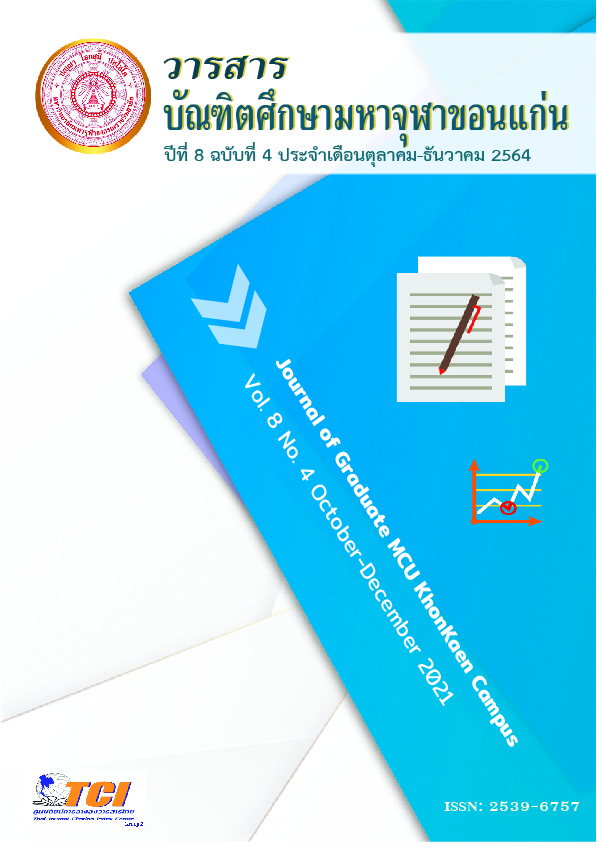A PHILOSOPHY OF THE NATURAL LAW WHICH INFLUENCE ON THE CONSTITUTION OF THE KINGDOM OF THAILAND B.E.2560
Main Article Content
Abstract
The aims of this research were: 1) to study the philosophy of natural law;
2) to study the Constitution of the Kingdom of Thailand B.E. 2560; 3) to study the philosophy
of natural law which influence on such the Constitution. The tools of this documentary
research were: to collecting data from primary and secondary documents. The data were
analyzed with describing according to inductive method.
The research results revealed that:
1. Philosophy of natural law is the concept which belief that natural law is the
rule of right reason, dictate any act is good or evil. It is unchanging, the same everywhere,
all times alike Dharma of Buddhism and is one with justice. We cannot be freed from its
obligations. The law of man is a part of this law. Humans are rational, intelligent, able to
access this law and it is the philosophy which honors human dignity, all human have
equal right and freedoms in life and body. The rule has hold the sovereign power belong
to people and separates them into three are legislative, executive and judiciary and there
is the check and balance. And it is the rule by the people.
2. This such Constitution confirms the sovereign power belong to the Thai people,
restricts the State’s power by separation such power into three are legislative, executive
and judiciary; There is the check and balance and adopts a democratic regime with the
King as Head of State who shall exercise such power through the National Assembly, the
Council of Ministers and the Courts. All organizations of State shall perform duties in accordance
with the Constitution, laws and the rule of law. there are system of check and control
the exercise of State power and provisions for protect human dignity, rights, liberty equality
and property of private
3. The Constitution’s provisions specific which protect human dignity, rights, liberty
in life, body, equality and private’s property and which harmony with such the protection
are provisions which as influence of philosophy of natural law.
Article Details
References
คนไทย ก้วนหิ้น. (2554). ปัญหาทางกฎหมายเกี่ยวกับเสรีภาพในการแสดงความคิดเห็นของบุคคลในระบบกฎหมายไทย. ใน วิทยานิพนธ์นิติศาสตรมหาบัณฑิต. บัณฑิตวิทยาลัย: มหาวิทยาลัยธรรมศาสตร์.
ปรีดี เกษมทรัพย์. (2557). นิติปรัชญา. (พิมพ์ครั้งที่ 13). กรุงเทพมหานคร: คณะนิติศาสตร์, มหาวิทยาลัยธรรมศาสตร์.
ปรีดี พนมยงค์. (2552). แนวความคิดประชาธิปไตยของปรีดี. (พิมพ์ครั้งที่ 2). กรุงเทพมหานคร: สำนักพิมพ์สุขภาพใจ.
ศักดิ์ณรงค์ มงคล. (2558). ข้อความคิดว่าด้วยความยุติธรรมทางสิ่งแวดล้อมที่เป็นฐานคิดด้านสิทธิมนุษยชน. ใน ดุษฎีนิพนธ์ปรัชญาดุษฎีบัณฑิต.บัณฑิตวิทยาลัย: มหาวิทยาลัยธรรมศาสตร์.
สมยศ เชื้อไทย. (2556). นิติปรัชญาเบื้องต้น. (พิมพ์ครั้งที่ 16). กรุงเทพมหานคร: สำนักพิมพ์วิญญูชน.
สำนักงานเลขาธิการคณะรัฐมนตรี. (2560). รัฐธรรมนูญแห่งราชอาณาจักรไทย พุทธศักราช 2560. กรุงเทพมหานคร: สำนักพิมพ์คณะรัฐมนตรีและราชกิจจานุเบกษา. (เล่มที่ 134 ตอนที่ 40 ก วันที่ 6 เมษายน 2560).
อมรัน ระเด่นอาหมัด. (2556). การใช้สิทธิและเสรีภาพในการเคลื่อนไหวของภาคประชาชนในกระบวนการประชาธิปไตยภายใต้รัฐธรรมนูญไทย พ.ศ. 2550. ใน วิทยานิพนธ์รัฐประศาสนศาสตร์มหาบัณฑิต. บัณฑิตวิทยาลัย: มหาวิทยาลัยสงขลานครินทร์.
อาร์ม ตั้งนิรันดร. (2557). ความรู้เบื้องต้นเกี่ยวกับระบบกฎหมายจีน. กรุงเทพมหานคร: สำนักพิมพ์วิญญูชน.
John Winfred O’Toole. (2011). The Right of Revolution: An Analysis of Joho Locke and Thomas Hobbes’ Social Contract Theories. A senior honors thesis submitted to The college of Art and Sciences Honors Program. The Department of Philosophy: Boston College.

